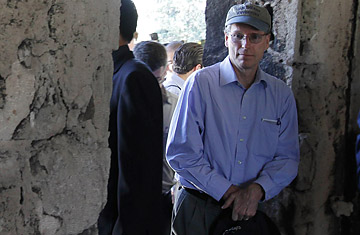
Ambassador Robert Ford tells TIME that while the Assad regime is creating a violent showdown, it's vital that the opposition refrain from turning to arms
(2 of 2)
They are largely engaging in defensive, rather than offensive, missions, they say, but that might change given that many Syrians now question whether protests and international pressure will be enough to dislodge Assad. The relatively successful Libyan example of armed insurrection beckons, but Syria is not Libya — it has far more ethnic and sectarian diversity, and is bordered by unstable states such as Lebanon and Iraq that share that simmering mix, not to mention Israel. A civil war in Syria could very easily engulf its neighbors.
Ford, who had a front-row seat to Iraq's sectarian civil war, is strongly advising the opposition against a turn to arms. "It would be a mistake," he says, not least because "you want to be sure that if you're even contemplating this, you have a way to know that whatever you're going to do militarily is going to be effective ... I very frankly say to people, you don't have enough force to fight the Syrian army, you're not even close. We have to be realistic."
The lesson of Iraq, Ford says, apart from forming a democratic transition plan early on, is that the opposition "absolutely has to get wide buy-in at the start," from all of Syria's diverse communities, especially the Alawites — the Shi'ite-related minority from which President Assad hails and from which most of the security and political elite is drawn.
That's easier said than done, says Radwan Ziadeh, a member of the SNC and a visiting scholar at the Institute for Middle East Studies at George Washington University. Although three prominent Syrian Alawite clerics recently issued a statement denouncing Assad's "atrocities" and urging their co-religionists to unhitch their fate from the President's inner clique, only a small number of Alawites have openly joined the opposition. Ziadeh says their presence is important, not only to infer nationwide credibility to the movement but also so that a process of reconciliation can begin.
Still, it's difficult to reach out to Alawites in Syria, in the midst of a continuing security crackdown largely orchestrated by senior members of that community and the regime's efforts to cast the conflict on sectarian lines. "This is the big challenge, especially when we see the torture that Alawite officers are committing," says Ziadeh, whose brother, an uncle and three cousins have all been detained, their whereabouts and fates are unknown.
Still, the international community is trying to create a wedge between the regime and its backers. It has slapped individual sanctions on key figures, as well as economic sanctions. Although Syria exports some 95% of its petroleum to Europe, Assad mocked the tougher penalties in his most recent speech in late August, saying that if the West was going to close its markets to him, he'd turn east: "Today, alternatives are available," he said.
Not really, says Ford. Syria's crude is heavy and sulphuric, the ambassador says, and needs refining. "The countries in the East that have [the necessary refining facilities], such as India, already have long-term supply contracts, so how are they going to sell to refineries that already have supplies and contracts? The Syrians are not going to be so easily able to just suddenly switch and put their crude in another market." That's why Ford and others are cautioning the opposition to wait for pressure and sanctions to bite, and the economy to crumble further rather than pick up arms. "Time isn't on Assad's side," he says.
The Gulf Arab states have "lost their patience" with Assad, Ford continues, highlighting the fact that Saudi Arabia and other Gulf states have withdrawn their ambassadors from Damascus. Although some Syrians fear that a deal may be brokered by Riyadh to keep a weakened, chastised Assad in power on the condition that he break with longtime allies Tehran and Hizballah, Ford doesn't see it happening. "I do not sense that they are looking to somehow re-engage [him] and pull him away from Iran."
Ford also isn't looking to re-engage Syrian officials. The ambassador — who has raised the regime's ire with his activist diplomacy by traveling to Hama and other flashpoint cities, as well as to pay his condolences in Dara'a to the family of Ghiyath Mattar, a rights activist tortured and killed by the regime — says he has not had a high-level political discussion with the Syrian government in weeks. His last meeting with an official was Tuesday, at the Foreign Ministry, a "routine issue about embassy operations and visas," Ford says. "We just have nothing to say," he adds. "They know we are looking for change on the ground."
